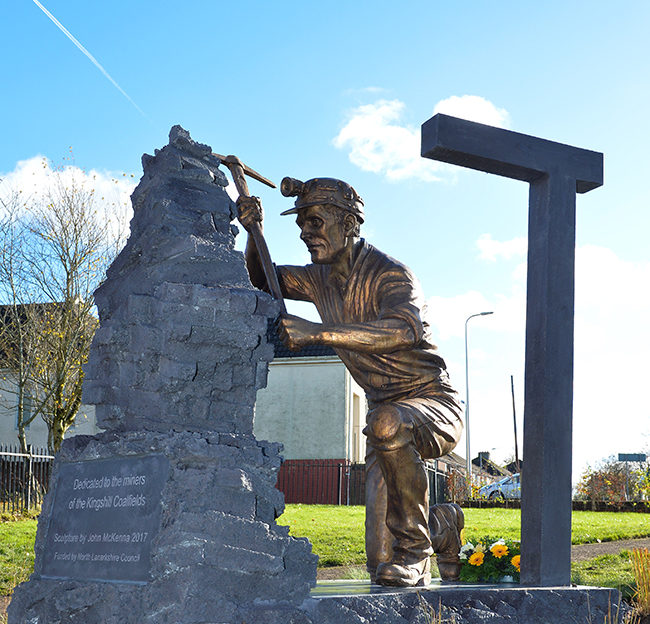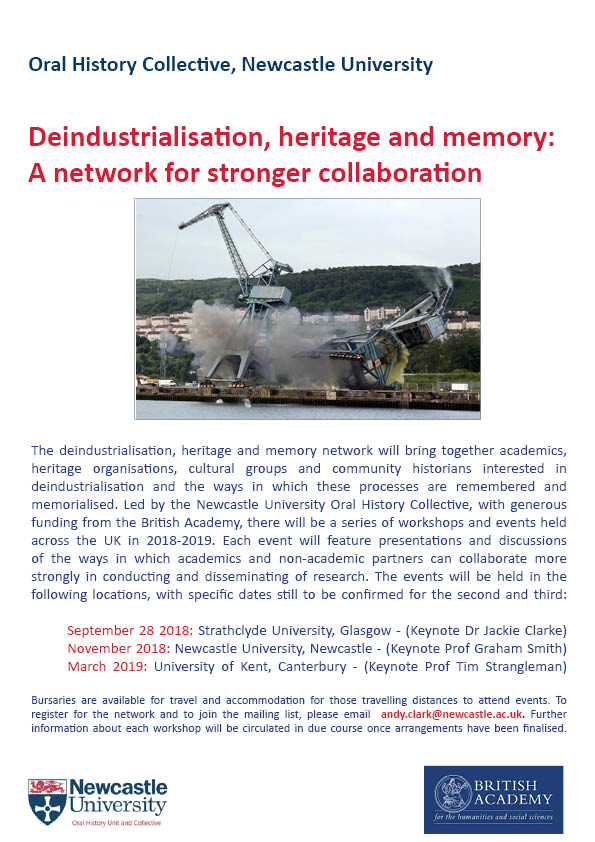In this Lug post, Andy Clark discusses a new network that he’s coordinating focused on deindustrialisation, heritage and memory. It aims to facilitate greater collaboration and discussion among academics, heritage groups, artists, and community historians interested in deindustrialisation and the memorialisation of manufacturing jobs and communities. Email andy.clark@newcastle.ac.uk to find out more, or to join the network’s mailing list.

Academic studies of deindustrialisation inevitably involve substantial engagement with communities impacted by industrial decline. Residents are our respondents, and their social groups inform the direction of our research. Similarly, community-based historians and heritage organisations are highly involved in the process of collecting narratives of job loss and the social impacts of manufacturing decline, with testimonies and monuments regularly forming a key part of exhibitions and regeneration efforts.
Despite the clear links between academics, heritage organisations and community groups in researching deindustrialisation, there is no network to coordinate the work being conducted or its outputs. This significantly reduces the potential impact of the research, and will lead to the unnecessary duplication of projects. The deindustrialisation, heritage and memory engagement activity will create a formal network to strengthen collaboration and engagement between all researchers interested in deindustrialisation and its impacts on communities in the UK and beyond.
This engagement programme will consist of three workshops aimed at early career researchers, established academics, community-based historians, and heritage workers across the UK to discuss the ways in which closer engagement and collaboration can benefit understandings of deindustrialisation. Fundamental to this engagement will be discussions of how to maximise the potentially large public and academic impact of research being conducted. Each workshop will be organised around a single theme that will contribute to achieving better working relationships that benefits the study of deindustrialisation and allows communities to participate in the recording and dissemination of memories and narratives.
The social and cultural impacts of deindustrialisation on communities is a highly active area of historical and sociological research (see High, MacKinnon and Perchard, 2017). Moving the discussion beyond economics, there is a much greater interest in the experiences and perspectives of those living in areas traditionally dependent on manufacturing employment. This has inevitably involved a high level of engagement between academic researchers and members of communities impacted, particularly in the collection of oral history interviews to capture perspectives of ‘what it means and how it feels to live in a deindustrializing society’ (Strangleman, Rhodes and Linkon 2013). Oral history has been the accepted methodological approach in assessing the impacts of deindustrialisation on those left behind by capital migration.
The field has had significant public and academic impact, emerging as one of the key areas of recent historical and sociological research. International networks have been established to promote transnational discussion, and outputs are regularly incorporated in media productions, public exhibitions, and in public art such as murals and monuments (Clark and Gibbs, 2018).

For those interested in engaging with this network, three workshops will be held in three different locations. These workshop will include a variety of roundtable discussions, workshop activities, and a keynote lecture from a key scholar in the fields of oral history, public history, and deindustrialisation. The scheduled workshops are:
September 28th 2018 – Scottish Oral History Centre, University of Strathclyde (Dr Jackie Clarke keynote)
November 2018 – Newcastle Oral History Collective, Newcastle University (Prof Graham Smith keynote)
March 2019 – School of Social Policy, Sociology and Social Research, University of Kent (Prof Tim Strangleman keynote)
It is hoped that these workshops, and the network and conversations generated, will help to promote closer and stronger collaboration among academics, artists, community historians, and others. The workshops are open to everyone with an interest in the multiple facets of deindustrialisation and its impacts on former industrial communities.
Travel and accommodation bursaries are available for those that wish to travel to the workshops. Please contact andy.clark@newcastle.ac.uk to join our mailing list and receive registration information for each event.
